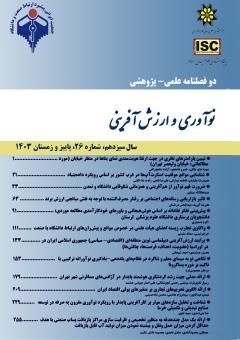پیش بینی تفکر نقادانه بر اساس هوش هیجانی و باورهای خودکارآمدی مطالعه موردی: دانشجویان پرستاری دانشگاه علوم پزشکی لرستان
محورهای موضوعی : عمومى
1 - استادیار، گروه مدیریت بازرگانی، دانشگاه آزاد اسلامی، واحد خرم آباد، خرم آباد، ایران
کلید واژه: تفکر نقادانه, هوش هیجانی, باورهای خودکارآمدی, رشته پرستاری, رگرسیون چند متغیره.,
چکیده مقاله :
پژوهش حاضر به پیش بینی تفکر نقادانه براساس هوش هیجانی و باورهای خودکارآمدی دانشجویان رشته پرستاری پرداخته و هدف از آن بررسی رابطه تأثیر هوش هیجانی و باورهای خودکارآمدی بر تفکر نقادانه دانشجویان رشته پرستاری است. اصلی ترین سؤالی که برای نگارش مقاله وجود دارد این است که رابطه تفکر نقادانه با هوش هیجانی و باورهای خودکارآمدی چیست؟ روش تحقیق استفاده شده روش همبستگی بوده و برای جمع آموری دادههای تحقیق از پرسشنامه استفاده گردید که دارای روایی و پایایی مناسبی بود (آلفای کرونباخ پرسشنامه تفکر انتقادی 0.76 ، پرسشنامه هوش هیجانی 0.83 ، و برای متغیر باورهای خودکارآمدی 0.83) و نمونه ای به حجم 148 نفر به روش طبقه بندی تصادفی از جامعه آماری انتخاب گردید.
برای تجزیه و تحلیل دادهها از نرم افزار SPSS استفاده گردید. نتایج نشان داد که باورهای خودکارآمدی و هوش هیجانی قادر به پیشبینی تفکر نقادانه دانشجویان هستند.
This research focuses on predicting critical thinking based on the emotional intelligence and self-efficacy beliefs of nursing students, with the aim of examining the impact relationship of emotional intelligence and self-efficacy beliefs on the critical thinking of nursing students. The main question addressed in this article is: What is the relationship between critical thinking, emotional intelligence, and self-efficacy beliefs? The research method used was correlational, and data was collected using a questionnaire with suitable validity and reliability (Cronbach's alpha for the critical thinking questionnaire was 0.76, the emotional intelligence questionnaire was 0.83, and the self-efficacy beliefs variable was 0.83). A sample of 148 students was selected randomly from the statistical population. The data was analyzed using SPSS software. The results showed that self-efficacy beliefs and emotional intelligence can predict the critical thinking of the students
Akbarzadeh, N. (2008). Emotional intelligence from the perspective of Salvi and others, Tehran, Farabi Publications, first edition.
Boyatzis, R. E., Goleman, D., and Rhee, K. (2000). Clustering competence in emotional intelligence: Insights from the Emotional Competence Inventory (ECI)s. In R. Bar-On and J.D.A. Parker (eds.), Handbook of emotional intelligence. San Francisco: Jossey-Bass, pp. 343-362.
Dastyari, A., Zarei matin, H., Danaeefard, H., Yazdani, H., & Babashahi, J. (2021). Exploring the Students’ Critical Thinking Disposition (Case study: Farabi Campus Students, University of Tehran). Public Management Researches, 14(51), 65-93. doi: 10.22111/jmr.2021.32722.4926
Goleman, Daniel. (2020). EQ. Translated by Nasreen Parsa 2019. 3rd edition, Tehran: Rushd Publications.
Khojasteh, S., Architect, S., Kianpour, M. (2014).The Situation of Tendency towards Critical Thinking in Students of the University of Isfahan and Some Factors Related to It, Journal of Applied Sociology, 2 (54), 117-138. (Persian)
Mayer,J.D.Salovey, p,.& Caruso, D.R. (2019). Emotional intelligence meets traditional standards for?an intelligence .Journal of Intelligence .27.pp:267-269.
Ricketts, J. C. (2003). The efficacy of leadership development, critical thinking dispositions, and student academic performance on the critical thinking skills of selected youth leaders. Unpublished doctoral dissertation, University of Florida, Gainesville. available at :http://etd.fcla.edu/UF/UFE0000777/ricketts_j.pdf.
Ranjdoost, Sh,. Eivazi, P,. (2013). The Relationship Between Emotional Intelligence of Teachers and High School Students Creative Thinking. Curriculum Planing Knowledge & Research in Educational Sciences, 10((36)), 113-125. SID. https://sid.ir/paper/127524/en
Sarvari M, Musavi Chilak A, Ziaee S. The Effect of Emotional Intelligence on the Critical Thinking of Librarians in the National Library of Iran. Human Information Interaction 2018; 4 (4)
URL: http://hii.khu.ac.ir/article-1-2707-fa.html
Orujlu S, Hemmati Maslakpak M. Assessing the Relationship between Critical Thinking and Self-Efficacy of Nursing Student. 3 JNE 2017; 5 (6) :11-17
URL: http://jne.ir/article-1-761-fa.html
Vahedi S, Marandi Heydarlou M, Imanzadeh A. The relationship between emotional intelligence and critical thinking in nursing students of Tabriz University of Medical Sciences. DSME 2015; 2 (1) :47-57
URL: http://dsme.hums.ac.ir/article-1-83-fa.html

